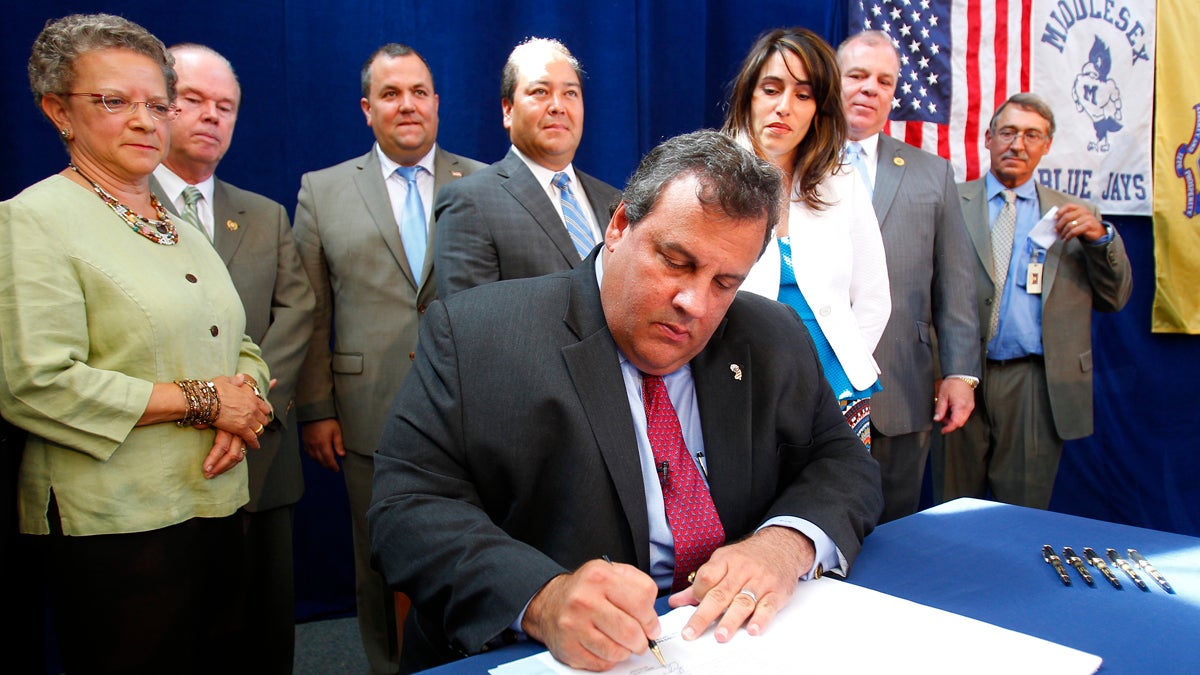Commentary: Patrick Diegnan’s anti-testing bill is really about teacher tenure

Gov. Christie signs the teacher tenure reform bill on Aug. 6, 2012. (AP Photo/Rich Schultz)
New Jersey State Assemblyman Patrick Diegnan’s (D-South Plainfield) new opt-out-of-testing proposal, A-4165, guts the ability of parents, teachers, schools, and the state to make reality-based judgments about student achievement, school quality, and whether or not New Jersey is providing equitable opportunities to poor students and children with disabilities.
Well, let’s be fair. Assemblyman Diegnan’s bill may be educationally unsound, but its political underpinnings are robust. After all, the anti-testing movement is in full froth, gathering adherents as politically diverse as Newark Mayor Ras Baraka and hard right-winger Rick Santorum. So let’s look at the bright side: Assemblyman Diegnan’s bill offers New Jersey a valuable opportunity to examine the implications — fiscal, administrative, educational — of mandating that local school districts offer procedures for parents to opt-out their children from annual state standardized testing.
The bill, if passed by the State Legislature, would “establish a procedure for a parent or guardian of a public school student to provide written notification that the student will not participate in the administration of a standardized assessment.” In other words, school districts would be required to create and implement procedures that make it easy for parents to opt-out children from standardized assessments.
But the bill isn’t just about that scourge called PARCC. Opting-out procedures must be provided for “any standardized assessment that is scheduled to be administered to the student in that school year.” This, presumably, would include vital internal assessments used regularly by many schools to gauge student learning and hone instruction, like NWEA, IOWA, and TerraNova, as well as Study Island and Read 180. Advanced Placement tests too.
Diegnan’s bill also mandates that “in the case of a student who does not participate in the administration of a standardized assessment pursuant to the provisions of section 2 of this act, a school district or charter school shall provide educationally appropriate alternative activities during the time in which the assessment is being administered. Any alternative activity shall not occur in the same room in which the assessment is being administered.”
Translation: schools must somehow conjure up extra classrooms for opting-out students, as well as the money to pay additional certified teachers to provide those “educationally appropriate alternative activities.”
Most critically, of course, is the potential impact of the bill on student learning. School-wide assessments drive classroom instruction; teachers rely on test scores to gauge student understanding and academic growth; administrators rely on test scores to fine-tune curricula; the State relies on test scores to determine funding needs, especially for districts that serve poor and minority students; parents rely on test scores, among other things, to make school choices. But that data is useless if we’re only testing some students.
Here’s education historian Diane Ravitch (before she underwent her conversion from scholar to union hack):
“Absent standards, poor and minority children do not have equal access to challenging courses; absent assessments, no one can know the size of the gap between schools or groups of students or whether that gap is growing larger or smaller. Without valid standards and assessments, there is no way to identify low-performing schools or to determine whether all students are receiving equal educational opportunity.”
So why would Assemblyman Diegnan propose a bill that is educationally, administratively, and fiscally unsound?
Welcome to politics. NJEA is the second largest contributor to Diegnan’s campaigns — ($16.5 thousand just in 2011) and even NEA, NJEA’s mother, has provided a generous $32K. NJEA’s government relations director Ginger Gold Schnitzer explains, “It’s not going to be just one bill. We’re now sorting out what is out there and seeing what needs to be amended … Bills are out there, and I think you will see more.”
Here’s the real point of the Diegnan’s bill: NJEA’s leaders are determined to undermine the bilateral teacher tenure and evaluation system they once endorsed, one which ties, in small part, student growth data to teacher effectiveness. If we can’t measure student growth because too many students opt-out, then we can’t measure teacher proficiency through student data.
This isn’t about PARCC: N.J.’s has administered standardized tests for decades. This isn’t about student stress: children who participated in the state pilot of PARCC last year did just fine. This isn’t about personal liberty: it’s about civil rights, about the academic needs of disadvantaged students who, in an unmeasured school system, get lost in reductions to aggregated averages.
_______________________________________________
Laura Waters is vice president of the Lawrence Township School Board in Mercer County. She also writes about New Jersey’s public education on her blog NJ Left Behind. Follow her on Twitter @NJLeftbehind.
WHYY is your source for fact-based, in-depth journalism and information. As a nonprofit organization, we rely on financial support from readers like you. Please give today.





